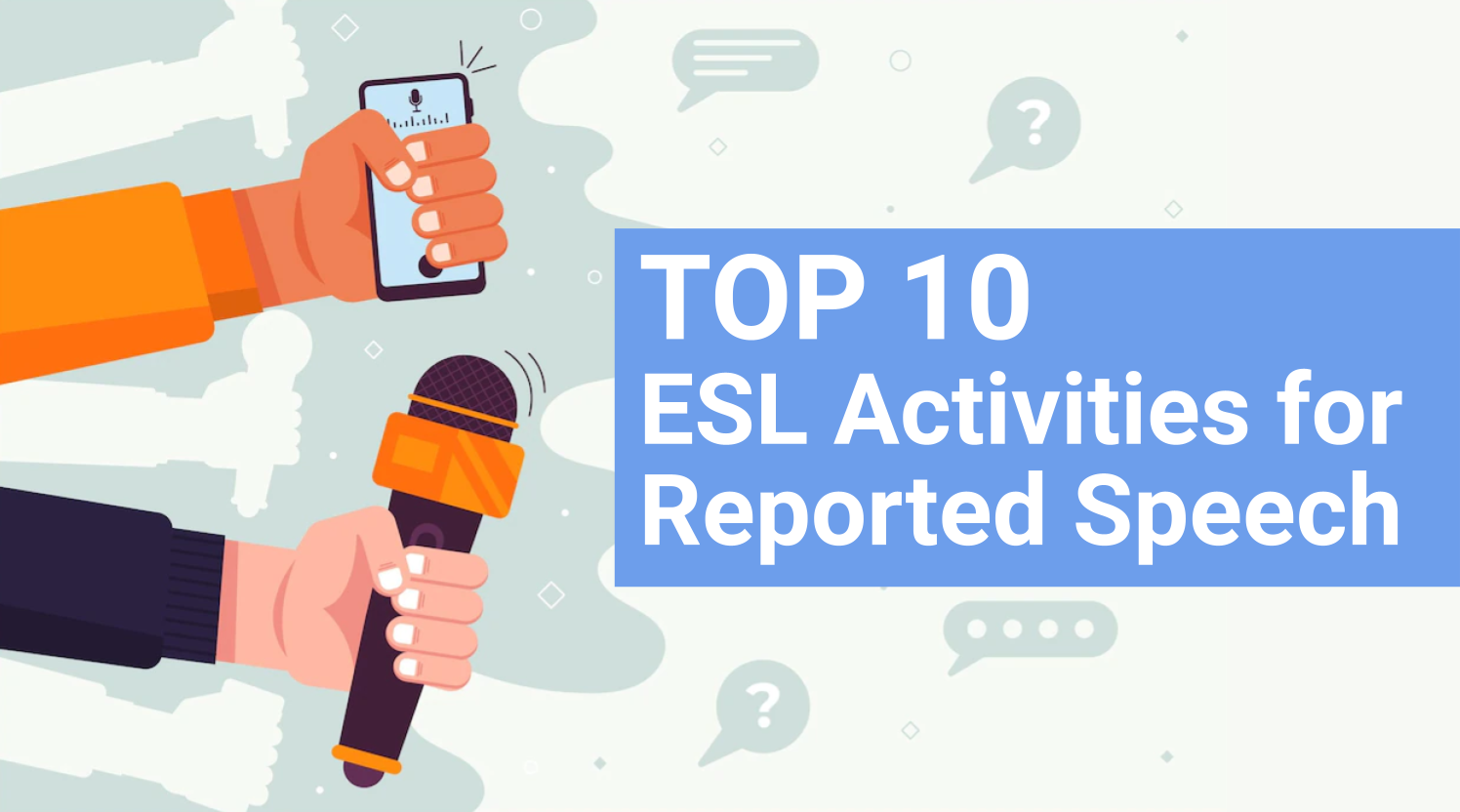ESL Speaking
Games + Activities to Try Out Today!
in Activities for Adults · Activities for Kids

Tell your Story | ESL Speaking Activity to Practice Reported Speech
If you’re looking for a reported speech speaking activity, look no further than tell your story . It’s a fun reported speech activity to try out with your higher-level ESL or EFL students. Keep on reading for all the details you need to know about teaching indirect speech!

Speaking Activity to Practice Reported Speech
You can often find a unit on reported speech in most intermediate-level English textbooks. But, it’s not that easy to design some ESL activities to practice this. Not to worry. Keep on reading for one of the best reported speech activities to try out with your students.
Check out one of my favourites: “Tell a Story.” It’s fun, and engaging, and creates some great opportunities for students to practice this important skill. Reported speech activities don’t have to be terrible any longer! Have some fun with reported speech ESL.
Reported Speech ESL Speaking Activity
Skills: Writing/reading/speaking/listening Time: 15-30 minutes Level: Intermediate to Advanced Materials Required: Nothing
Have students write something interesting. Some examples are the most embarrassing moment, the scariest thing you’ve ever done, your dream for the future, future predictions , etc. Base it on whatever topic you are studying in class that day. Make it clear to the students that it should be something they’re willing to share with the entire class so as not to write something very private.
Then, distribute the stories to other people in the class. Then the students have to go around the class, finding the person whose story they have by asking questions. Once they find that person, they have to ask them three interesting questions about the story. And the person who originally wrote the story has to answer them of course.
I like this part of it because it gets students up and out of their seats, moving around and talking to different people. It gets boring sitting down all the time and talking to only 1 person! It’s ideal for those sleepy classes that you might have on Friday afternoon or those ones who are just waking up on Monday morning.

Reported speech ESL activities
Teaching Tips for Tell Your Story:
Emphasize to students that they are to practice asking good questions. For example, “USA?” is not a good question, while, “Did you study abroad in the USA?” is much better. Full sentences are the key here.
Also, emphasize that students should think of interesting follow-up questions that expand upon their knowledge about that situation. This involves reading carefully so they can avoid asking about things that are already mentioned.
You can give your students a couple of minutes before the activity starts to write down a few questions based on the paper they received to help facilitate this. Based on the topic you’ve assigned for the story, there should be some obvious ones that they’d want to ask.
This activity provides an excellent opportunity for your students to work on reported speech. This is something that high-level students are often surprisingly weak at. If you have a small class (less than 10), students can report what they learned about their partner to everyone.
If larger, students can tell their seating partner what they learned. For example, students might say something like, “I talked to Min-Ji. She told me that she got in a car accident last year. She said that it was really scary, but thankfully nobody got injured seriously.”
Procedure for this Reported Speech Activity:
- Have students write an interesting story based on a certain topic. Adjust for length and difficulty depending on your students.
- Collect stories and redistribute them–one per student, making sure a student does not get their own story.
- Students go around the class asking people if that is their story. For example, “Did you get in a car accident when you were little?”
- When they find the person, they must ask them three interesting follow-up questions about it.
- Do the optional variation of having students tell other people what they learned about their classmate in order to practice using reported speech.
- Follow-up with a worksheet, other activity or homework assignment.
Do You Like this Reported Speech ESL Speaking Activity?

- Amazon Kindle Edition
- Bolen, Jackie (Author)
- English (Publication Language)
- 148 Pages - 03/09/2016 (Publication Date)
If you like this ESL speaking activity to help your students practice reported speech, then you’re going to love this book: 101 ESL Activities: For Teenagers and Adults . It’s lesson planning made easy, guaranteed. The key to better English classes is a wide variety of engaging and interactive games and activities and this book will help you get there in style.
There are dozens of top-quality ESL games and activities for teenagers and adults that are organized into various categories: reading, writing, speaking, writing, warm-ups, and 4-skills. You’re sure to find something that will work for any level of students or topic.
You can get the book on Amazon in both print and digital formats. The (cheaper!) digital copy can be read on any device by downloading the free Kindle reading app. It’s super easy to have fun, engaging ESL activities with you anywhere you go.
Or, buy the book and keep it as a handy reference on your bookshelf, or teacher supply room. You can check out 101 ESL Activities for yourself over on Amazon:
Teaching Reported Speech FAQs
There are a number of common questions that people have about reported speech games and activities for English learners. Here are the answers to some of the most popular ones.
What is reported speech in English?
Reported speech is when we talk about or repeat what someone else has said using our own words.
Why do we use reported speech?
We use reported speech to share information, statements, or questions that someone else has said.
What changes occur when turning direct speech into indirect speech?
Pronouns, tense, and time expressions often change for indirect speech.
Can you give an example of direct speech changing to reported speech?
Direct: She said, “I am going to the store.” Reported: She said that she was going to the store.
What happens to the pronouns in reported speech?
Pronouns usually change to match the perspective of the speaker in reported speech.
How do you shift tenses in reported speech?
Generally, you shift the tense back one step. For example, present simple becomes past simple.
Do all time expressions remain the same in indirect speech?
No, time expressions usually change, e.g., “now” becomes “then,” “today” becomes “that day.”
What’s the reporting verb?
The verb that introduces indirect speech can be things like, “said,” “told,” “asked.”
Can questions be reported too?
Yes, questions can be reported using reporting verbs like “asked” or “wondered.”
How do you report imperative sentences?
Imperative sentences are reported using the verb “to” + infinitive, or with phrases like “ordered” or “told.”
What’s the key to successfully teaching indirect speech to ESL students?
Practice and exposure through various exercises and real-life examples are crucial for understanding indirect speech.

Reported speech games and activities for ESL

Tell your Story English Speaking Activity: Have your Say!
What do you think of this activity to practice ESL reported speech? Is it a good one or do you have another reported speech lesson plan activity that you’d like to recommend? Leave a comment below and let us know your thoughts. We’d love to hear from you.
Also be sure to give this article a share on Facebook, Pinterest, or Twitter. It’ll help other busy teachers, like yourself find this useful resource.
Last update on 2024-09-27 / Affiliate links / Images from Amazon Product Advertising API
About Jackie
Jackie Bolen has been teaching English for more than 20 years to students in South Korea and Canada. She's taught all ages, levels and kinds of TEFL classes. She holds an MA degree, along with the Celta and Delta English teaching certifications.
Jackie is the author of more than 100 books for English teachers and English learners, including 101 ESL Activities for Teenagers and Adults , Great Debates for ESL/EFL , and 1001 English Expressions and Phrases . She loves to share her ESL games, activities, teaching tips, and more with other teachers throughout the world.
You can find her on social media at: YouTube Facebook Pinterest Instagram
Leave a Reply Cancel reply
Your email address will not be published. Required fields are marked *
Our Top-Seller

As an Amazon Associate, I earn from qualifying purchases.
More ESL Activities

Weekend Plans (Easy English Dialogue for Beginners)

Ordering Sushi (Easy English Dialogue for Beginners)

Feeling Under the Weather: English Dialogue & Practice Questions

Meeting Someone New Dialogue (For English Learners)
About, contact, privacy policy.
Jackie Bolen has been talking ESL speaking since 2014 and the goal is to bring you the best recommendations for English conversation games, activities, lesson plans and more. It’s your go-to source for everything TEFL!
About and Contact for ESL Speaking .
Privacy Policy and Terms of Use .
Email: [email protected]
Address: 2436 Kelly Ave, Port Coquitlam, Canada

100 Reported Speech Examples: How To Change Direct Speech Into Indirect Speech
Reported speech, also known as indirect speech, is a way of communicating what someone else has said without quoting their exact words. For example, if your friend said, “ I am going to the store ,” in reported speech, you might convey this as, “ My friend said he was going to the store. ” Reported speech is common in both spoken and written language, especially in storytelling, news reporting, and everyday conversations.
Reported speech can be quite challenging for English language learners because in order to change direct speech into reported speech, one must change the perspective and tense of what was said by the original speaker or writer. In this guide, we will explain in detail how to change direct speech into indirect speech and provide lots of examples of reported speech to help you understand. Here are the key aspects of converting direct speech into reported speech.
Reported Speech: Changing Pronouns
Pronouns are usually changed to match the perspective of the person reporting the speech. For example, “I” in direct speech may become “he” or “she” in reported speech, depending on the context. Here are some example sentences:
- Direct : “I am going to the park.” Reported : He said he was going to the park .
- Direct : “You should try the new restaurant.” Reported : She said that I should try the new restaurant.
- Direct : “We will win the game.” Reported : They said that they would win the game.
- Direct : “She loves her new job.” Reported : He said that she loves her new job.
- Direct : “He can’t come to the party.” Reported : She said that he couldn’t come to the party.
- Direct : “It belongs to me.” Reported : He said that it belonged to him .
- Direct : “They are moving to a new city.” Reported : She said that they were moving to a new city.
- Direct : “You are doing a great job.” Reported : He told me that I was doing a great job.
- Direct : “I don’t like this movie.” Reported : She said that she didn’t like that movie.
- Direct : “We have finished our work.” Reported : They said that they had finished their work.
- Direct : “You will need to sign here.” Reported : He said that I would need to sign there.
- Direct : “She can solve the problem.” Reported : He said that she could solve the problem.
- Direct : “He was not at home yesterday.” Reported : She said that he had not been at home the day before.
- Direct : “It is my responsibility.” Reported : He said that it was his responsibility.
- Direct : “We are planning a surprise.” Reported : They said that they were planning a surprise.
Reported Speech: Reporting Verbs
In reported speech, various reporting verbs are used depending on the nature of the statement or the intention behind the communication. These verbs are essential for conveying the original tone, intent, or action of the speaker. Here are some examples demonstrating the use of different reporting verbs in reported speech:
- Direct: “I will help you,” she promised . Reported: She promised that she would help me.
- Direct: “You should study harder,” he advised . Reported: He advised that I should study harder.
- Direct: “I didn’t take your book,” he denied . Reported: He denied taking my book .
- Direct: “Let’s go to the cinema,” she suggested . Reported: She suggested going to the cinema .
- Direct: “I love this song,” he confessed . Reported: He confessed that he loved that song.
- Direct: “I haven’t seen her today,” she claimed . Reported: She claimed that she hadn’t seen her that day.
- Direct: “I will finish the project,” he assured . Reported: He assured me that he would finish the project.
- Direct: “I’m not feeling well,” she complained . Reported: She complained of not feeling well.
- Direct: “This is how you do it,” he explained . Reported: He explained how to do it.
- Direct: “I saw him yesterday,” she stated . Reported: She stated that she had seen him the day before.
- Direct: “Please open the window,” he requested . Reported: He requested that I open the window.
- Direct: “I can win this race,” he boasted . Reported: He boasted that he could win the race.
- Direct: “I’m moving to London,” she announced . Reported: She announced that she was moving to London.
- Direct: “I didn’t understand the instructions,” he admitted . Reported: He admitted that he didn’t understand the instructions.
- Direct: “I’ll call you tonight,” she promised . Reported: She promised to call me that night.
Reported Speech: Tense Shifts
When converting direct speech into reported speech, the verb tense is often shifted back one step in time. This is known as the “backshift” of tenses. It’s essential to adjust the tense to reflect the time elapsed between the original speech and the reporting. Here are some examples to illustrate how different tenses in direct speech are transformed in reported speech:
- Direct: “I am eating.” Reported: He said he was eating.
- Direct: “They will go to the park.” Reported: She mentioned they would go to the park.
- Direct: “We have finished our homework.” Reported: They told me they had finished their homework.
- Direct: “I do my exercises every morning.” Reported: He explained that he did his exercises every morning.
- Direct: “She is going to start a new job.” Reported: He heard she was going to start a new job.
- Direct: “I can solve this problem.” Reported: She said she could solve that problem.
- Direct: “We are visiting Paris next week.” Reported: They said they were visiting Paris the following week.
- Direct: “I will be waiting outside.” Reported: He stated he would be waiting outside.
- Direct: “They have been studying for hours.” Reported: She mentioned they had been studying for hours.
- Direct: “I can’t understand this chapter.” Reported: He complained that he couldn’t understand that chapter.
- Direct: “We were planning a surprise.” Reported: They told me they had been planning a surprise.
- Direct: “She has to complete her assignment.” Reported: He said she had to complete her assignment.
- Direct: “I will have finished the project by Monday.” Reported: She stated she would have finished the project by Monday.
- Direct: “They are going to hold a meeting.” Reported: She heard they were going to hold a meeting.
- Direct: “I must leave.” Reported: He said he had to leave.
Reported Speech: Changing Time and Place References
When converting direct speech into reported speech, references to time and place often need to be adjusted to fit the context of the reported speech. This is because the time and place relative to the speaker may have changed from the original statement to the time of reporting. Here are some examples to illustrate how time and place references change:
- Direct: “I will see you tomorrow .” Reported: He said he would see me the next day .
- Direct: “We went to the park yesterday .” Reported: They said they went to the park the day before .
- Direct: “I have been working here since Monday .” Reported: She mentioned she had been working there since Monday .
- Direct: “Let’s meet here at noon.” Reported: He suggested meeting there at noon.
- Direct: “I bought this last week .” Reported: She said she had bought it the previous week .
- Direct: “I will finish this by tomorrow .” Reported: He stated he would finish it by the next day .
- Direct: “She will move to New York next month .” Reported: He heard she would move to New York the following month .
- Direct: “They were at the festival this morning .” Reported: She said they were at the festival that morning .
- Direct: “I saw him here yesterday.” Reported: She mentioned she saw him there the day before.
- Direct: “We will return in a week .” Reported: They said they would return in a week .
- Direct: “I have an appointment today .” Reported: He said he had an appointment that day .
- Direct: “The event starts next Friday .” Reported: She mentioned the event starts the following Friday .
- Direct: “I lived in Berlin two years ago .” Reported: He stated he had lived in Berlin two years before .
- Direct: “I will call you tonight .” Reported: She said she would call me that night .
- Direct: “I was at the office yesterday .” Reported: He mentioned he was at the office the day before .
Reported Speech: Question Format
When converting questions from direct speech into reported speech, the format changes significantly. Unlike statements, questions require rephrasing into a statement format and often involve the use of introductory verbs like ‘asked’ or ‘inquired’. Here are some examples to demonstrate how questions in direct speech are converted into statements in reported speech:
- Direct: “Are you coming to the party?” Reported: She asked if I was coming to the party.
- Direct: “What time is the meeting?” Reported: He inquired what time the meeting was.
- Direct: “Why did you leave early?” Reported: They wanted to know why I had left early.
- Direct: “Can you help me with this?” Reported: She asked if I could help her with that.
- Direct: “Where did you buy this?” Reported: He wondered where I had bought that.
- Direct: “Who is going to the concert?” Reported: They asked who was going to the concert.
- Direct: “How do you solve this problem?” Reported: She questioned how to solve that problem.
- Direct: “Is this the right way to the station?” Reported: He inquired whether it was the right way to the station.
- Direct: “Do you know her name?” Reported: They asked if I knew her name.
- Direct: “Why are they moving out?” Reported: She wondered why they were moving out.
- Direct: “Have you seen my keys?” Reported: He asked if I had seen his keys.
- Direct: “What were they talking about?” Reported: She wanted to know what they had been talking about.
- Direct: “When will you return?” Reported: He asked when I would return.
- Direct: “Can she drive a manual car?” Reported: They inquired if she could drive a manual car.
- Direct: “How long have you been waiting?” Reported: She asked how long I had been waiting.
Reported Speech: Omitting Quotation Marks
In reported speech, quotation marks are not used, differentiating it from direct speech which requires them to enclose the spoken words. Reported speech summarizes or paraphrases what someone said without the need for exact wording. Here are examples showing how direct speech with quotation marks is transformed into reported speech without them:
- Direct: “I am feeling tired,” she said. Reported: She said she was feeling tired.
- Direct: “We will win the game,” he exclaimed. Reported: He exclaimed that they would win the game.
- Direct: “I don’t like apples,” the boy declared. Reported: The boy declared that he didn’t like apples.
- Direct: “You should visit Paris,” she suggested. Reported: She suggested that I should visit Paris.
- Direct: “I will be late,” he warned. Reported: He warned that he would be late.
- Direct: “I can’t believe you did that,” she expressed in surprise. Reported: She expressed her surprise that I had done that.
- Direct: “I need help with this task,” he admitted. Reported: He admitted that he needed help with the task.
- Direct: “I have never been to Italy,” she confessed. Reported: She confessed that she had never been to Italy.
- Direct: “We saw a movie last night,” they mentioned. Reported: They mentioned that they saw a movie the night before.
- Direct: “I am learning to play the piano,” he revealed. Reported: He revealed that he was learning to play the piano.
- Direct: “You must finish your homework,” she instructed. Reported: She instructed that I must finish my homework.
- Direct: “I will call you tomorrow,” he promised. Reported: He promised that he would call me the next day.
- Direct: “I have finished my assignment,” she announced. Reported: She announced that she had finished her assignment.
- Direct: “I cannot attend the meeting,” he apologized. Reported: He apologized for not being able to attend the meeting.
- Direct: “I don’t remember where I put it,” she confessed. Reported: She confessed that she didn’t remember where she put it.
Reported Speech Quiz
Thanks for reading! I hope you found these reported speech examples useful. Before you go, why not try this Reported Speech Quiz and see if you can change indirect speech into reported speech?

- All topics A-Z
- Grammar
- Vocabulary
- Speaking
- Reading
- Listening
- Writing
- Pronunciation
- Virtual Classroom
- Worksheets by season
- 600 Creative Writing Prompts
- Warmers, fillers & ice-breakers
- Coloring pages to print
- Flashcards
- Classroom management worksheets
- Emergency worksheets
- Revision worksheets
- Resources we recommend
- Copyright 2007-2021 пїЅ
- Submit a worksheet
- Mobile version
